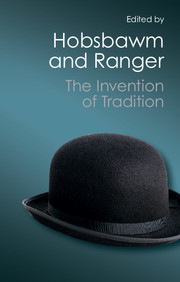Book contents
- Frontmatter
- Contents
- Contributors
- 1 Introduction: Inventing Traditions
- 2 The Invention of Tradition: The Highland Tradition of Scotland
- 3 From a Death to a View: The Hunt for the Welsh Past in the Romantic Period
- 4 The Context, Performance and Meaning of Ritual: The British Monarchy and the ‘Invention of Tradition’, c. 1820–1977
- 5 Representing Authority in Victorian India
- 6 The Invention of Tradition in Colonial Africa
- 7 Mass-Producing Traditions: Europe, 1870–1914
- Index
4 - The Context, Performance and Meaning of Ritual: The British Monarchy and the ‘Invention of Tradition’, c. 1820–1977
Published online by Cambridge University Press: 05 July 2014
- Frontmatter
- Contents
- Contributors
- 1 Introduction: Inventing Traditions
- 2 The Invention of Tradition: The Highland Tradition of Scotland
- 3 From a Death to a View: The Hunt for the Welsh Past in the Romantic Period
- 4 The Context, Performance and Meaning of Ritual: The British Monarchy and the ‘Invention of Tradition’, c. 1820–1977
- 5 Representing Authority in Victorian India
- 6 The Invention of Tradition in Colonial Africa
- 7 Mass-Producing Traditions: Europe, 1870–1914
- Index
Summary
In 1820, The Black Book, a radical critique of the corruption and power of the English Establishment, made this comment on royal ritual:
Pageantry and show, the parade of crowns and coronets, of gold keys, sticks, white wands and black rods; of ermine and lawn, maces and wigs, are ridiculous when men become enlightened, when they have learned that the real object of government is to confer the greatest happiness on the people at the least expense.
Forty years later, Lord Robert Cecil, the future third marquess of Salisbury, having watched Queen Victoria open parliament, wrote with scarcely more approval:
Some nations have a gift for ceremonial. No poverty of means or absence of splendour inhibits them from making any pageant in which they take part both real and impressive. Everybody falls naturally into his proper place, throws himself without effort into the spirit of the little drama he is enacting, and instinctively represses all appearance of constraint or distracted attention.
But, he went on to explain:
This aptitude is generally confined to the people of a southern climate and of non-Teutonic parentage.
- Type
- Chapter
- Information
- The Invention of Tradition , pp. 101 - 164Publisher: Cambridge University PressPrint publication year: 2012
- 31
- Cited by

